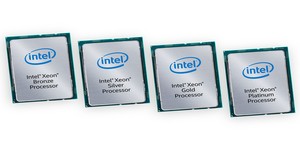Intel has officially announced its latest Xeon processors with up to 18 cores, fully-functional transactional memory extensions, and support for up to 32-socket systems.
As with all Xeon chips, the new Xeon Processor E7 v3 is designed for enterprise use, but these latest chips go beyond the company's previous releases thanks to an increase to 18 physical cores - a 20 per cent boost over the previous generation's core-count. Coupled with support for up to 36 sockets in a single system through the use of a third-party node controller module that's up to 648 physical cores, coupled with support for 1.5TB of memory per socket for a grand total of 48TB of DDR3 or DDR4 RAM, although the more common eight-socket edition will max out at 12TB.
The top-end 18-core models boast 45MB of last-level cache, while the whole family benefits from Intel's Transactional Synchronisation Extensions (TSX). This latter feature was introduced as part of the Haswell microarchitecture and offers the ability to set code regions as suitable for transactional synchronisation, allowing for improved performance in multi-threaded applications. It's a feature of particular interest for business users, but one which was disabled in early Haswell models thanks to a flaw in the system discovered by a third-party. With the issue now resolved, Intel can begin shipping chips with TSX enabled - and the result is a claim of a six-fold boost to the performance of in-memory transactional workloads when TSX-enabled software is running.
'In the digital services economy, success or failure can depend on how quickly businesses act on insight from vast stores of data,' claimed Intel senior vice president and general manager of the Data Centre Group Diane Bryant at the launch. 'The Intel Xeon processor E7 v3 family is the engine for accelerating business intelligence through real-time analytics, enabling businesses to improve customer satisfaction through more personalised products and services, generate new revenue streams and enhance operational efficiency.'
With a target market like that, it's no surprise that Intel is pricing the Xeon chips at the upper end of the spectrum: the launch covers 12 models, including two high-frequency versions for database work, starting at $1,224 to a whopping $7,175 per processor in trays of 1,000. Systems based around the chips have been announced by Intel customers including Cisco, Dell, HP, Lenovo, SGI and Supermicro, among others.
As with all Xeon chips, the new Xeon Processor E7 v3 is designed for enterprise use, but these latest chips go beyond the company's previous releases thanks to an increase to 18 physical cores - a 20 per cent boost over the previous generation's core-count. Coupled with support for up to 36 sockets in a single system through the use of a third-party node controller module that's up to 648 physical cores, coupled with support for 1.5TB of memory per socket for a grand total of 48TB of DDR3 or DDR4 RAM, although the more common eight-socket edition will max out at 12TB.
The top-end 18-core models boast 45MB of last-level cache, while the whole family benefits from Intel's Transactional Synchronisation Extensions (TSX). This latter feature was introduced as part of the Haswell microarchitecture and offers the ability to set code regions as suitable for transactional synchronisation, allowing for improved performance in multi-threaded applications. It's a feature of particular interest for business users, but one which was disabled in early Haswell models thanks to a flaw in the system discovered by a third-party. With the issue now resolved, Intel can begin shipping chips with TSX enabled - and the result is a claim of a six-fold boost to the performance of in-memory transactional workloads when TSX-enabled software is running.
'In the digital services economy, success or failure can depend on how quickly businesses act on insight from vast stores of data,' claimed Intel senior vice president and general manager of the Data Centre Group Diane Bryant at the launch. 'The Intel Xeon processor E7 v3 family is the engine for accelerating business intelligence through real-time analytics, enabling businesses to improve customer satisfaction through more personalised products and services, generate new revenue streams and enhance operational efficiency.'
With a target market like that, it's no surprise that Intel is pricing the Xeon chips at the upper end of the spectrum: the launch covers 12 models, including two high-frequency versions for database work, starting at $1,224 to a whopping $7,175 per processor in trays of 1,000. Systems based around the chips have been announced by Intel customers including Cisco, Dell, HP, Lenovo, SGI and Supermicro, among others.

MSI MPG Velox 100R Chassis Review
October 14 2021 | 15:04









Want to comment? Please log in.